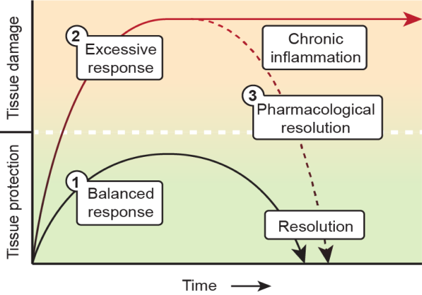
About
Gijs Kooij is a PI (assistant professor) at the Department of Molecular Cell Biology & Immunology as well as the MS center Amsterdam. His main research focus is to understand the natural process to resolve neuro-inflammation in order to provide new perspectives on the pathogenesis of chronic (unresolved) neuro-inflammatory diseases like multiple sclerosis (MS) and to reveal new treatment opportunities. He recently discovered endogenous lipid mediator circuits in the central nervous system (CNS) and revealed the absence of protective lipid mediators in various disease stages of MS. These findings in combination with personal Vidi (NWO) and Fellowship (Dutch MS society) grants have enabled him to establish his own research group on inflammation-resolution mechanisms in health and disease.
Research Line
(Re)solving MS: Understand and exploit endogenous protection mechanisms.
Inflammation is a host-protective response when properly orchestrated. Beside immune checkpoints, the inflammatory cascade boasts an additional checkpoint, driven by chemical lipid mediators that induce resolution of inflammation. These novel autacoids, called specialized pro-resolving lipid mediators (SPMs), not only inhibit the inflammatory response, they also actively terminate it, leading to the restoration of tissue homeostasis. Novel sensitive detection methods (i.e. lipidomics) have set the stage to identify and decode these SPMs, which opens new perspectives on the pathogenesis of chronic (unresolved) inflammatory diseases like multiple sclerosis (MS).
By using a state-of-the-art lipidomics and mass-spectrometry imaging approach in combination with primary cell cultures, ex vivo brain slice cultures, in vivo neuro-inflammation models and human post-mortem tissues, we will elucidate in the coming years how altered inflammation-resolving mechanisms underlie MS pathogenesis by investigating both fundamental (Vidi) and clinical (fellowship) aspects. His ultimate goal is to provide novel diagnostic, prognostic and therapeutic opportunities for MS and other chronic (neuro-)inflammatory diseases based on resolution pharmacology (Figure 1).

An effectively mounted inflammatory response will also trigger the activation of protective resolution pathways intended to safely terminate the inflammatory cascade and promote healing (1). Failed resolution can extend in time the actions of pro-inflammatory mechanisms resulting in prolonged (chronic) inflammation (2). I here propose that activation of endogenous circuits of resolution through novel resolution-based therapeutics (SPMs) can restore tissue structure and function to return to homeostasis (3).
Key publications
- Bogie J.F, Haidar M, Hendriks J.J.A and Kooij G. Fatty acid metabolism in the progression and resolution of CNS disorders. Advanced Drug Delivery Reviews. Conditionally accepted
- Derada Troletti C, Enzmann G, Chiurchiù V, Haghayegh N, Tietz S, Norris PC, van der Pol SMA, Serhan CN, de Vries HE, Engelhardt B and Kooij G. Pro-resolving lipid mediator Lipoxin A4 attenuates neuro-inflammation by modulating T cell responses and modifying the spinal cord lipidome. Cell Reports. Conditionally accepted.
- Kooij G, Derada Troletti C, Leuti A, Norris PC, Riley I, Albanese M, Ruggieri S, Libreros S, van der Pol SMA, van Het Hof B, Schell Y, Guerrera G, Buttari F, Mercuri NB, Centonze D, Gasperini C, Battistini L, de Vries HE, Serhan CN, Chiurchiù V. Specialized pro-resolving lipid mediators are differentially altered in peripheral blood of patients with multiple sclerosis and attenuate monocyte and blood-brain barrier dysfunction. Haematologica. 2019 Nov 28. pii: haematol.2019.219519. doi: 10.3324/haematol.2019.219519
- Kooij G, Kopplin K, Blasig R, Stuiver M, Koning N, Goverse G, van der Pol SM, van Het Hof B, Gollasch M, Drexhage JA, Reijerkerk A, Meij IC, Mebius R, Willnow TE, Müller D, Blasig IE, de Vries HE. Disturbed function of the blood-cerebrospinal fluid barrier aggravates neuro-inflammation. Acta Neuropathol. 2014 Aug 128(2): 267-77
- Kooij G, Kroon J, Paul D, Reijerkerk A, Geerts D, van der Pol SM, van Het Hof B, Drexhage JA, van Vliet SJ, Hekking LH, van Buul JD, Pachter JS, de Vries HE. P-glycoprotein regulates trafficking of CD8+ T cells to the brain parenchyma. Acta Neuropathol. 2014 May;127(5): 699-7112Aleyd E, van Hout MW, Ganzevles SH, Hoeben KA, Everts V, Bakema JE, van Egmond M. IgA enhances NETosis and release of neutrophil extracellular traps by polymorphonuclear cells via Fcα receptor I. J Immunol. 2014 Mar 1;192(5):2374-83.
Group members

Jelle Broos, MSc
PhD student
The primary focus of my research is the involvement of bioactive lipid mediators in Multiple Sclerosis. We are currently screening several large MS cohorts for these mediators and try to link their levels to clinical and MRI data in order to gain more insights in their function.

Julia Konings, MSc
PhD student
In my research we aim to explore the role of resolution in the development and pathogenesis of MS, focusing on the underlying mechanisms of impaired specialized pro-resolving lipid mediator production as observed in MS. This will be done by investigating expression levels and epigenetic signatures of receptors, transporters and enzymes involved in their biosynthesis and degradation.

Marc Franssen
PhD student
I focus mainly on lipid mediators in stroke and subarachnoid hemorrhage. In doing so I hope to explore how these lipid mediators modulate these pathologies. Specifically, the immunological response and that of the cells that make up the NVU is of great interest to me. For that purpose I am currently using LC-MS/MS, as well as trying to set a up a in vitro stroke model and hope to make use of 2-photon microscopy in the future.

Wing Hee Fung, MD
PhD student
My research interests center around the neurovascular crosstalk in health and disease, especially in Multiple Sclerosis. In addition, my research focuses on immunomodulatory lipids to promote neurovascular health. High-throughput analysis is used to identify biomarkers for prediction of disease state, disease progression and therapeutic response in Multiple Sclerosis.

Wing Ka Fung
research technician
My main research focus is to unravel the pathogenesis of Multiple Sclerosis by performing different molecular techniques, cell culture and immunohistochemistry.










